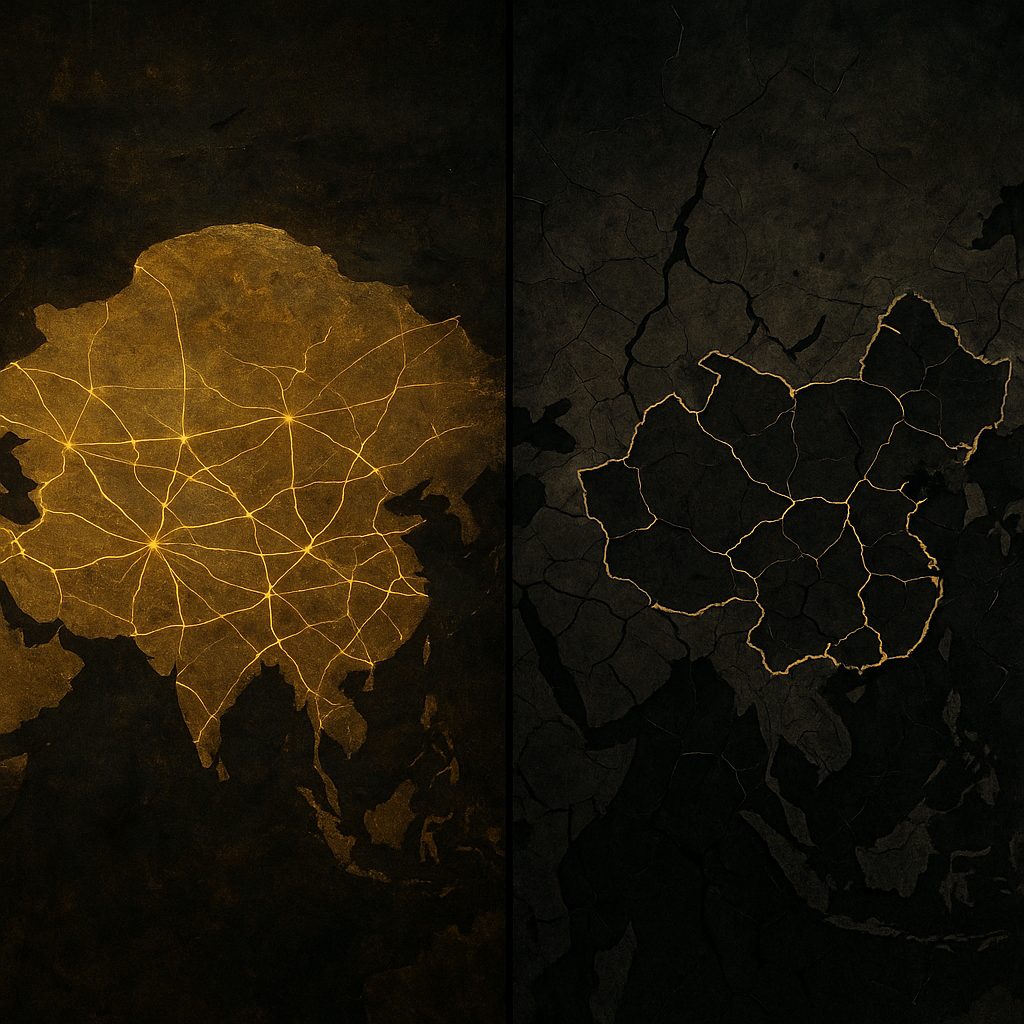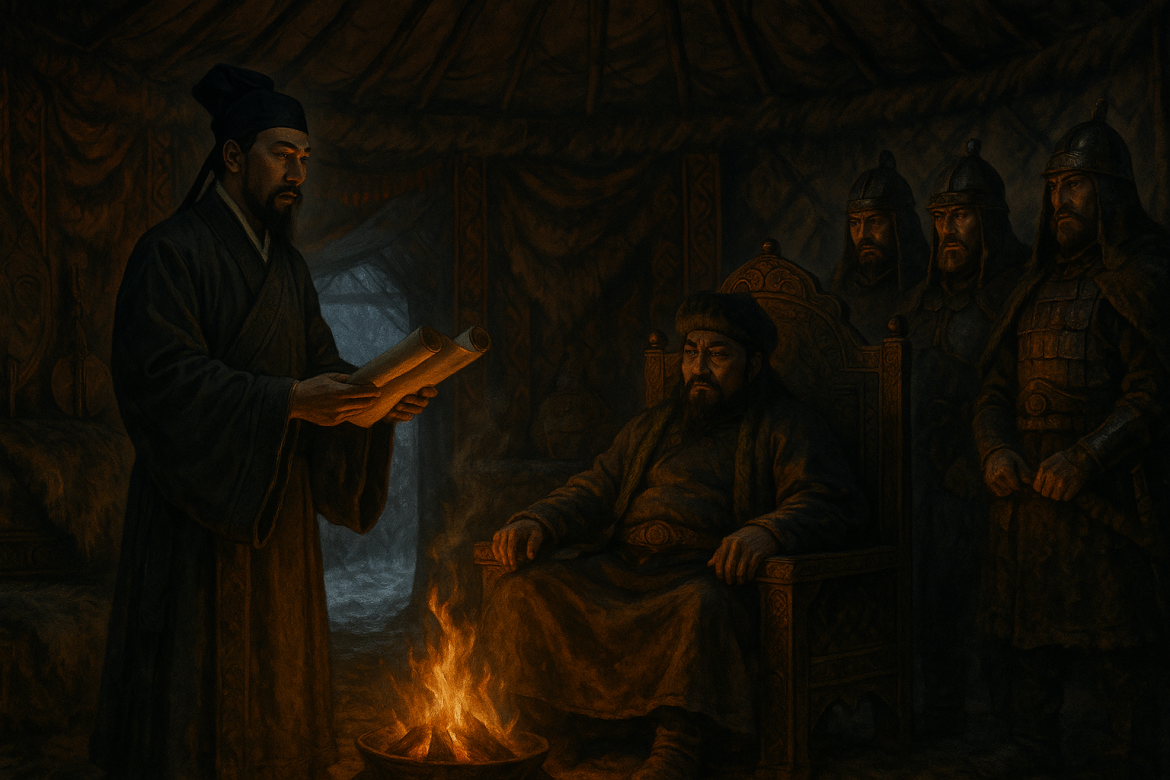From Our Favorite Historical Parallel Brother — Shamus Gerry III
The Modern Mystery
Something chilling happened in the corridors of economic power this week that would make history’s most ruthless emperors nod in recognition. President Trump didn’t just criticize Goldman Sachs’ research on tariff risks—he launched a calculated attack designed to make every analyst in America think twice before publishing inconvenient truths.
The target was Goldman’s latest report warning that Trump’s proposed tariffs could trigger inflation and economic disruption. Within hours of its release, Trump unleashed a barrage of criticism, calling the analysis “fake research” and suggesting that Goldman’s government contracts might be “reviewed.” The message was crystal clear: conform your analysis to my narrative, or face consequences.
This wasn’t subtle policy disagreement. This was raw intimidation of independent economic analysis—the kind of pressure that transforms objective researchers into compliant courtiers. Goldman’s analysts, some of the most respected voices in global finance, suddenly found themselves in the crosshairs of presidential wrath for doing exactly what they’re supposed to do: analyze economic data without political bias.
But here’s what makes this moment historically terrifying: it’s happened before. Not just once, but repeatedly across the centuries, whenever absolute power collides with inconvenient expertise. The pattern is so precise, so predictable, that it reads like a script written 800 years ago in the courts of the most powerful empire the world has ever known.
In the windswept steppes of 13th-century Mongolia, another ruler faced another scholar whose analysis threatened his plans. The consequences of that confrontation would echo through history, offering us a chilling preview of what happens when emperors decide that truth itself must bend to power.
The Time Portal
The year was 1229, and the most powerful man on Earth was about to make a decision that would determine whether millions lived or died. Ögedei Khan, son of Genghis Khan and ruler of an empire stretching from Korea to Eastern Europe, sat in his felt-lined ger as winter winds howled across the Mongolian steppes. Before him stood a man who dared to speak truths that emperors didn’t want to hear.
Yelü Chucai was an unlikely figure to hold such sway over the Mongol Empire. Born into Chinese nobility, captured during the Mongol conquest of the Jin dynasty, he possessed something the nomadic warriors desperately needed but instinctively distrusted: the ability to transform conquest into sustainable governance. His scholarly robes seemed absurdly delicate amid the leather and steel of the Mongol court, yet this captured intellectual had become the empire’s most trusted advisor.
The tension in that ger was palpable. Ögedei Khan had just announced his intention to distribute vast territories as personal fiefdoms to his relatives and generals—a decision that would fragment the empire’s administration and potentially bankrupt its treasury. It was the kind of grand gesture that appealed to nomadic traditions of sharing spoils, but Chucai’s careful analysis revealed a catastrophic flaw in the plan.
“Great Khan,” Chucai said, his voice steady despite the weight of contradicting the most powerful ruler in history, “this distribution of appanages will lead to the disintegration of the empire.” The words hung in the frigid air like a death sentence. Around the ger, Mongol generals shifted uncomfortably, their hands instinctively moving toward their weapons. No one spoke to the Khan this way. No one questioned imperial decisions with such directness.
But Chucai had built his reputation on exactly this kind of uncomfortable honesty. Years earlier, he had convinced Genghis Khan himself to abandon plans for wholesale slaughter of Chinese populations, arguing with devastating logic that “dead people don’t pay taxes.” His economic analysis had transformed the Mongol Empire from a purely destructive force into a sophisticated administrative machine capable of governing the largest contiguous land empire in human history.
Now, facing Ögedei’s dangerous generosity, Chucai was about to discover what happened when scholarly integrity collided with imperial pride. The parallels to a Goldman Sachs conference room in 2025 were about to become terrifyingly clear.
⚡ ENERGY INDEPENDENCE ALERT
Slash Your Power Bills by 90% with This 100-Year-Old Secret
The same government that pressures economic analysts doesn’t want you to know about this century-old technology that can eliminate your dependence on the power grid. Discover the Lost Generator method that’s helping Americans achieve energy independence before it’s banned.
The Parallel Revelation

The parallels between that Mongol ger and a modern Goldman Sachs boardroom are so precise they seem scripted by history itself. In both cases, we see the same fundamental dynamic: independent experts delivering unwelcome analysis to rulers who view disagreement as disloyalty.
Yelü Chucai’s position in the Mongol court mirrors that of Goldman’s analysts today with eerie accuracy. Both were trusted advisors whose expertise had previously saved their leaders from costly mistakes. Chucai had revolutionized Mongol governance, creating taxation systems that generated far more wealth than traditional plunder. Goldman’s research had guided countless investment decisions, helping clients navigate complex economic terrain. Both had earned their influence through demonstrated competence, not political allegiance.
Yet when their analysis conflicted with their rulers’ preferred narratives, both faced the same imperial rage. Ögedei Khan’s reaction to Chucai’s warnings about territorial distribution was identical in spirit to Trump’s response to Goldman’s tariff research: How dare you question my judgment with your inconvenient facts?
The psychology driving both confrontations reveals the eternal tension between expertise and authority. Ögedei Khan, like Trump, had surrounded himself with advisors precisely because he needed their knowledge, yet he resented their independence. The Khan wanted Chucai’s administrative genius but not his uncomfortable truths about fiscal responsibility. Trump wants Goldman’s analytical credibility but not their warnings about economic consequences.
Both rulers employed the same intimidation tactics. Ögedei began excluding Chucai from key decisions, undermining his authority within the court hierarchy. Trump threatened Goldman’s government contracts, using economic leverage to pressure compliance. The message in both cases was identical: conform your analysis to support my decisions, or lose your access to power.
The institutional dynamics are equally parallel. In 13th-century Mongolia, other court advisors watched Chucai’s treatment with growing alarm, understanding that their own positions depended on avoiding similar confrontations. Today, economists and analysts across Wall Street are undoubtedly taking notes, recognizing that Goldman’s experience could easily become their own.
Most chilling of all is the identical justification both rulers used for their pressure campaigns. Ögedei Khan claimed that Chucai’s warnings undermined imperial authority and confused subordinates who needed clear direction. Trump argues that Goldman’s research spreads “fake” information that damages confidence in his economic policies. Both framed independent analysis as a threat to effective governance rather than its foundation.
The human psychology hasn’t evolved one bit. The same pride, the same insecurity, the same inability to distinguish between personal criticism and professional analysis that drove Ögedei Khan’s anger in 1229 is driving Trump’s attacks on Goldman Sachs today. The technology has changed, the scale has expanded, but the fundamental dynamic remains frozen in time: absolute power cannot tolerate inconvenient truth.
The Pattern Recognition
This pattern repeats across millennia because it exposes the fundamental contradiction at the heart of all authoritarian power: rulers need expertise to govern effectively, yet expertise inevitably challenges their assumptions and limitations.
The psychological mechanism is brutally simple. Leaders accumulate power partly through confidence and decisiveness—qualities that become liabilities when confronted with complex analysis that suggests their instincts might be wrong. The very traits that help someone seize power make it nearly impossible for them to accept that their judgment might be flawed.
Yelü Chucai understood this dynamic with painful clarity. He had watched Genghis Khan struggle with the same tension, wanting the benefits of scholarly advice while resenting its implications. The great conqueror had ultimately accepted Chucai’s counsel because the results were undeniable—taxation generated more wealth than plunder, administration proved more valuable than destruction. But Ögedei Khan, inheriting power rather than earning it through conquest, felt less secure in his authority and more threatened by contradiction.
This insecurity explains why inherited or elected power often proves more hostile to independent analysis than power seized through force. Genghis Khan knew he had conquered the world; Ögedei Khan had to prove he deserved to rule it. Trump, having won an election rather than built an empire through personal achievement, faces similar psychological pressure to demonstrate his competence by rejecting any suggestion that his policies might have flaws.
The pattern persists because human nature hasn’t evolved. We still have the same cognitive biases, the same emotional reactions to criticism, the same tendency to confuse personal authority with objective truth. The tools of intimidation have become more sophisticated—threatening government contracts instead of exile or execution—but the underlying dynamic remains identical.
Most tragically, this pattern always produces the same result: the gradual replacement of competent advisors with compliant ones, leading to increasingly poor decisions based on increasingly distorted information. The empire begins to crumble not from external threats, but from internal blindness.
🌱 The 4-Foot Farm That Feeds a Family of 4
While empires collapse from rejecting expert advice, smart families are building food security with this revolutionary farming method. Discover how to grow a year’s worth of food in just 4 square feet – the same technique that sustained communities through historical upheavals.
The Ancient Warning

The consequences of Ögedei Khan’s rejection of Chucai’s warnings played out exactly as the scholar had predicted, offering a chilling preview of what happens when rulers prioritize loyalty over expertise.
By 1240, Chucai found himself increasingly marginalized, his influence undermined by court rivals who told the Khan what he wanted to hear rather than what he needed to know. The territorial distributions he had warned against proceeded as planned, fragmenting the empire’s administration and creating competing power centers that prioritized local interests over imperial stability.
Chucai died in 1244, reportedly from frustration and exhaustion after years of watching his careful administrative systems dismantled by political expedience. Within a generation, the unified Mongol Empire had fractured into competing khanates, each pursuing independent policies that often conflicted with imperial interests. The economic efficiency that Chucai had built through rational taxation and administration gave way to the short-term thinking and personal enrichment that he had spent his career trying to prevent.
The empire that had once been history’s most effective administrative machine became a collection of feuding territories, vulnerable to external threats and internal rebellion. The rejection of uncomfortable expertise had transformed the world’s largest empire into a cautionary tale about the price of preferring pleasant lies to difficult truths.
The warning for modern America couldn’t be clearer: when rulers begin intimidating independent analysis, imperial decline follows as surely as night follows day.
5 Things You Can Do This Week
History’s pattern is clear, but individual preparation can provide protection when institutional analysis becomes unreliable:
1. Diversify Your Information Sources: When official economic analysis comes under political pressure, independent research becomes invaluable. Build relationships with multiple financial advisors and economists who aren’t dependent on government contracts. Survival Stronghold offers guides on building information networks that remain reliable during institutional breakdown.
2. Develop Economic Self-Reliance: Yelü Chucai’s taxation systems worked because they created genuine economic value. Focus on building skills and assets that generate real wealth regardless of political turbulence. Self Reliance Report provides practical strategies for reducing dependence on volatile economic systems.
3. Create Physical Security Buffers: When empires fragment, as the Mongol Empire did after rejecting expert advice, local communities must become self-sufficient. Homesteader Depot offers resources for building food security and essential supplies that protect families during economic disruption.
4. Maintain Health Independence: Political pressure on expertise often extends to medical and health information. Freedom Health Daily provides research on maintaining wellness without complete dependence on institutional medical systems.
5. Build Community Resilience: The Mongol Empire’s strength came from tribal loyalty and mutual support. Seven Holistics explores traditional approaches to community building that have sustained societies through political upheaval for millennia.
The pattern is ancient, but preparation remains possible for those who recognize the warning signs.
